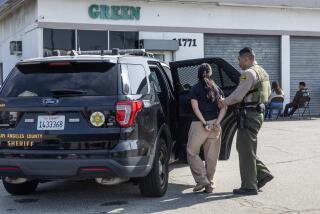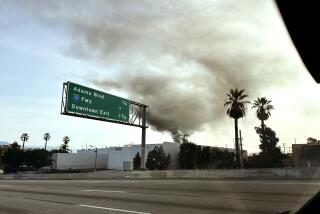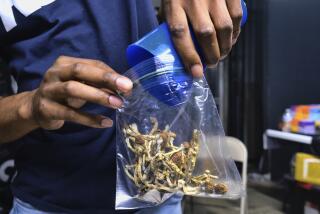‘Loco Weed’ Tied to Attack on Paramedics
- Share via
“I had heard about loco weed and horses--anybody’s who has seen enough Westerns knows about that,” said Sgt. Kent Setty of the Devonshire police station. “But in 19 years on the job, I had never heard of any person ingesting it until last night.”
Into Setty’s station Wednesday night came three disoriented young men, arrested for allegedly attacking paramedics after a traffic accident, who said they were under the influence of jimson weed--the “loco weed” cowboys tried to keep their horses and cattle away from in Western folklore.
“I haven’t heard about people messing around with jimson weed in 10 years,” said Sgt. Gil Rivera, an LAPD narcotics officer. Abuse of the weed was more common in the psychedelic era of the late 1960s, he said.
Not Well-Known
“It’s not known by a lot of people in this day and age.”
The men told officers they had spent the day in Castaic, drinking tea brewed with jimson weed, Setty said. Officers found a bag of jimson weed leaves in the men’s car.
The three were arrested on suspicion of assault after a brawl with three paramedics who were dispatched to the scene of an auto accident involving a car in which they were passengers. One of the paramedics suffered a bite on the hand and an injured back.
All three suspects eventually had to be hospitalized for poisoning by jimson weed, which contains a potentially lethal drug.
Because they had not encountered jimson weed users before, Devonshire Station police assumed that the three were under the influence of PCP. The men were incoherent and acting strangely, Setty said, and one had to be restrained after he repeatedly walked into a wall.
“He would make a right turn, look right at the wall and then walk right into it. Obviously he was not focusing his eyes real well,” Setty said.
This kind of behavior is common among those suffering from jimson weed poisoning, said Daniel X. Freedman, professor of pharmacology and psychiatry at UCLA. Users are frequently violent, delirious, confused, paranoid, and exhibit speech disturbance, impaired motor coordination, and sometimes, convulsions, Freedman said.
“I can see exactly why, if I were a cop, it would look like PCP,” he said.
Dry Skin, Flushed Face
However, unlike those under the influence of PCP, jimson weed users have dry skin, flushed faces and “pupils as big as you’ll ever see pupils,” Freedman said. They can also run very high fevers, have irregular heart rates, and experience nausea or vomiting.
The effects the abuser seeks, Freedman said, are sensations of mild euphoria, drowsiness, hallucinations and forgetfulness.
Jimson weed, also known as wild cucumber and devil’s weed, is a member of the highly poisonous deadly nightshade family of plants and grows wild in vacant lots and along roadsides throughout the western United States. Its active ingredient is atropine, which is used in small amounts for medicinal purposes, said Sidney Cohen, clinical professor of psychiatry at UCLA.
However, he added, “It’s actually a poison, and if you take enough it can do you in.”
Temperature of 108
One of the three men, David Michael Stickle, 19, was admitted to Granada Hills Community Hospital in critical condition after he appeared to have stopped breathing and had a temperature of 108 degrees and a pulse of 170, Setty said. Stickle remained in the critical care unit Thursday, in stable condition.
The others--Adrian Pascal, 22, of Northridge and Keith Sanders, 18, of Granada Hills--were treated at Holy Cross Hospital in Mission Hills and released.
Setty said police would ask the Los Angeles district attorney’s office today to bring felony charges of assault on a firefighter against all three men. Possession or use of jimson weed is not illegal.
Most police officers and drug experts interviewed said jimson weed use is rare. But incidents like the one this week worry them.
There are deadly hazards in “taking a holiday from reality with such a dangerous substance,” Cohen said. “One would hope this is isolated.”
More to Read
Sign up for Essential California
The most important California stories and recommendations in your inbox every morning.
You may occasionally receive promotional content from the Los Angeles Times.













